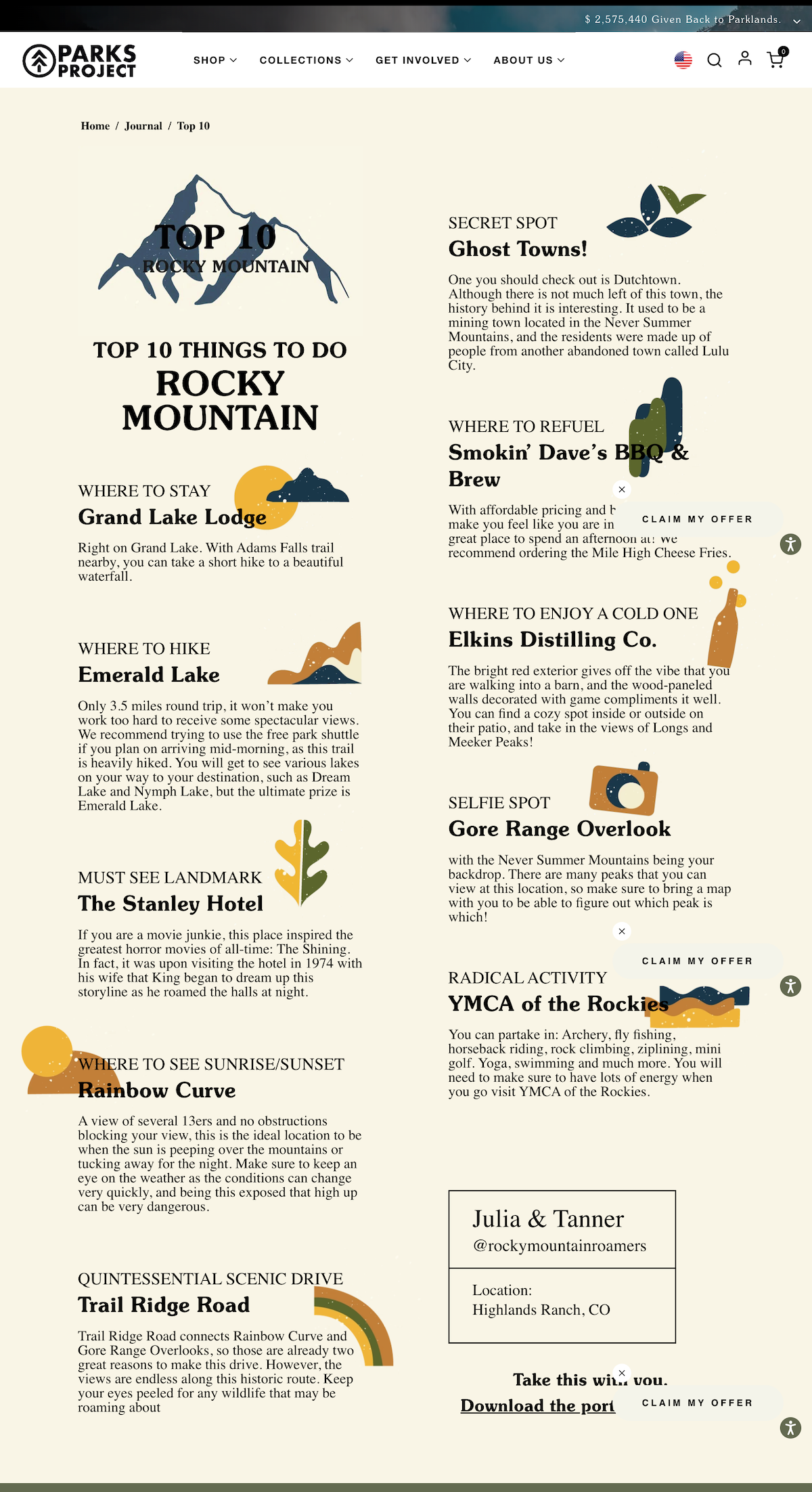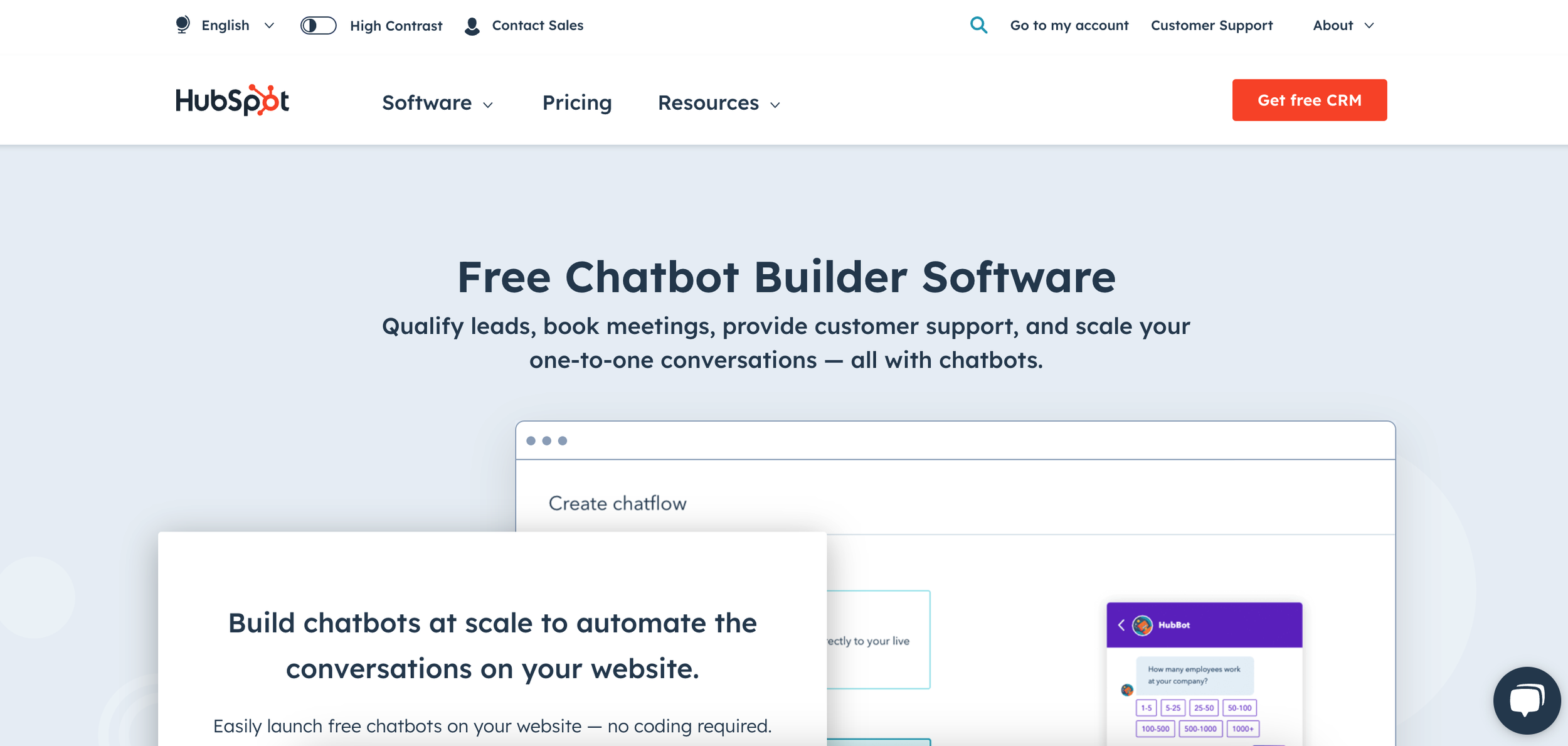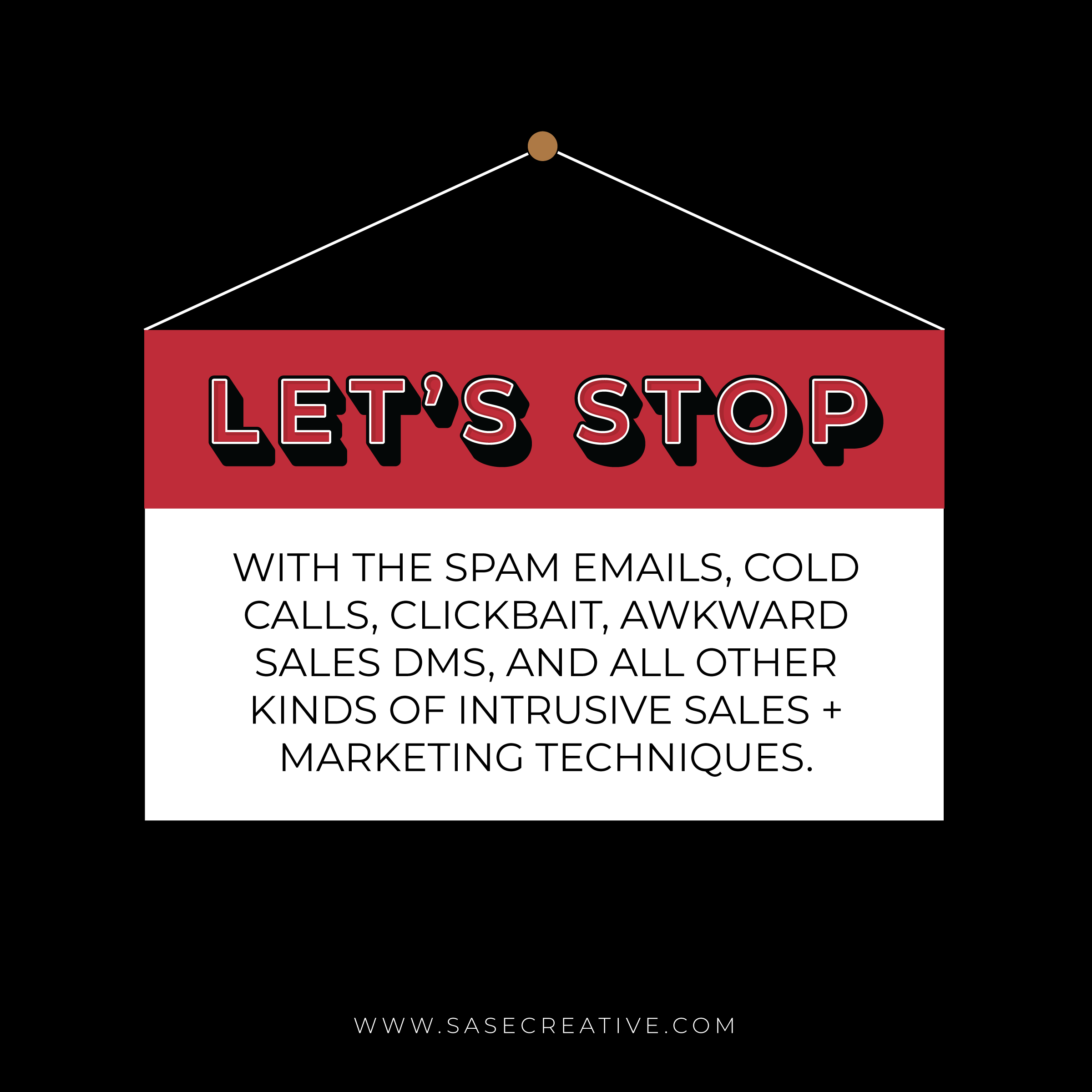10 Ways to Piss off Your Target Audience
Let’s explore rude sales + marketing tactics that can negatively impact your brand
I recently was mistakenly signed up for a promotion from an insurance agency. I am still getting phone calls and texts even though I’ve asked them multiple times to take me off their list. I hadn’t even signed up to get calls. As a marketer, I know my phone number is now out there on multiple sales lists for this company and sales agents will continue to pester me. The only thing I can do is block and report these as spam.
As a millennial, I cannot stress how much I hate receiving unsolicited phone calls, texts, and emails. It’s the fastest way to make me lose interest in a product or service. You can rest assured that when I'm ready to talk with a salesperson, I’ll reach out. But, bombing me with texts, emails, and/or phone calls will only push me away from your brand.
Research shows that 75% of people feel bombarded with advertisements throughout their daily lives. Is your brand adding to that bombardment?
I know that I’m not the only one who has noticed more extreme and disruptive sales tactics. From cold-calling to spamming, companies often resort to rude and irritating marketing methods that do nothing but alienate potential customers.
Bulbshare published an Adblockers and Advocacy Research Report on why Gen Z (and other generations) are blocking paid advertisements in favor of authentic voices.
Here are some of the most interesting findings from the report:
75% feel bombarded with advertisements throughout their daily lives.
74% finding themselves irritated by this incursion on their time.
75% try their best to avoid ads at any opportunity.
If there’s a skip button on an ad, 99% said they’d be likely to press it.
86% would be more inclined to buy a product recommended by a friend than a paid influencer.
According to research by Bulbshare, 75% feel bombarded with advertisements throughout their daily lives, and 74% finding themselves irritated by this incursion on their time
It’s easy to lose sight when you’re trying to get new business. But you have to be mindful of your target audience whenever you interact with them. You don’t want to frustrate potential leads by calling them repeatedly or blowing up their inbox.
Let’s start by looking at what kind of sales and marketing tactics to avoid. Here are ten of the most annoying (and rude) marketing and sales tactics that will piss off users if your not careful:
Cold-calling + Emailing without Prior Consent: Reaching out to someone without their permission can come across as pushy and invasive.
Pressure Tactics: Some salespeople try to force a sale by applying pressure on the customer, such as limited-time offers or implying that the deal won't be available if they don't buy immediately. Let people take time when making purchase decisions. You have every right to make up your mind when spending money on something.
Email + Text Spamming: Spamming is more annoying and invasive than sending one cold email. Sending numerous emails or messages to someone without their consent is irritating and can make the user less likely to want to do business with you.
Clickbait + Other Forms of Deceptive Advertising: Companies sometimes use misleading or false claims to attract customers, which can be unethical and annoying when the claims turn out to be untrue. I see this happen a lot on social media with titles and headers that get users to click just to read a really lame article. Let’s just stop being deceptive.
Interrupting People's Day: Trying to sell products or services to someone when they're busy, such as during a meal or while they're working, can be frustrating and inconsiderate. I don’t know who needs to hear this, but we don’t have time to interrupt our entire day just so you can give us a sales pitch. Wait for people to approach you, don’t interrupt them.
Ignoring Customer Needs: Focusing on a sales pitch without taking the time to understand the customer's needs or concerns can come across as selfish and dismissive. If someone isn’t ready to buy or isn’t a fit for your product, find this out quickly so you can move on to someone who is your target audience.
Ignoring Personal Boundaries: Persisting with a sales pitch after someone has made it clear they're not interested can be intrusive and disrespectful. You should have a way for people to opt out of communications.
Bait + Switch Tactics: Promising one thing to get the customer's attention, but then delivering something entirely different can be dishonest and disappointing.
Hard Selling: Continuing to push a sale even after the customer has expressed disinterest can be frustrating and make the person feel uncomfortable. If a user isn’t interested in buying, they should be able to opt out of communications.
Hidden Costs: Failing to disclose all costs associated with a product or service can be seen as sneaky and unfair to the customer. I see this happen a lot with apps and software. Be sure to clearly communicate your prices to your audience.
Millennials and Gen Z want authentic and personalized experiences. These generations have pretty much been bombarded since birth with tv ads and social media ads so they have a negative view of pushy sales and marketing tactics. When it comes to making buying decisions, these generations prefer to conduct their own research, prioritize brands aligned with their values, and seek genuine value from a brand.
Here are a few reasons why people tend to prefer less-pushy sales and marketing tactics:
Authenticity: People are more likely to respond positively to brands that engage with them in a genuine and transparent manner, rather than employing pushy sales tactics.
Digital Savviness: Millennials and Gen Z are digital natives who are adept at navigating online platforms. They are often exposed to lots of marketing messages so they can easily identify and reject aggressive or intrusive marketing techniques.
Negative Response to Intrusion: Pushy sales and marketing tactics, such as cold-calling, spamming, and aggressive sales pitches are often perceived as interruptive and disrespectful, and can lead to a loss of interest in a brand or product.
Self-Directed Research: Today, most people (especially millennials and Gen Z) are more likely to conduct their own research and seek out information about products and services before making a purchase decision. They prefer to be in control of their buying process and find pushy sales tactics off-putting.
Desire for Value and Purpose: Millennials and Gen Z prioritize brands that align with their values and offer products or services that provide actual value to them. They’re more likely to engage with brands that focus on building relationships and delivering meaningful content rather than aggressive selling.
Millennials and Gen Z can quickly recognize and reject sales techniques like cold-calling and aggressive pitches. They prefer to be approached respectfully and with personalized messaging. This shows how important it is for your brand to adopt an authentic and customer-centric approach to marketing. Younger generations will only continue to cringe at sales-oriented messaging and targeting.
Here are some rules to follow when it comes to being respectful sales and marketing tactics:
Only contact people who have given you consent. If you find yourself buying an email list or signing up a contact for your newsletter, please stop and think about your actions. You should only be sending emails and texts to contacts who have asked to receive communications from you.
Give people a way to opt out of communications. People need a way to unsubscribe from texts or emails. Your emails should have a place at the very bottom where a contact can unsubscribe from communications. Remember to include this in all communications.
Stay truthful and transparent. Don’t give people false claims or make up dramatic headlines to get clicks on social media. People don’t have time for shady brands and it can potentially lead to backlash for your brand. Be honest and transparent in your communications with customers. Avoid misleading or exaggerated claims about your products or services.
There’s a fine line between following up and stalking. If a contact cancels a sales call or doesn’t seem too interested, that doesn’t mean you should have a sales guy pester them to sign up for a demo call. No answer doesn’t mean you should call and text someone ten times a day.
Respect people’s privacy. A lot of brands have valuable data from their customers at their fingertips. You should practice discretion when handling user data. Be sure to safeguard customer data and follow privacy regulations.
Treat people how you want to be treated. Remember that your talking to a human being. Showing that your brand is respectful matters more than just blindly throwing sales pitches at innocent bystanders.
At the heart of inbound marketing lies the fundamental principle of respecting customers, users, and website visitors. Instead of bombarding them with unsolicited messages and intrusive sales pitches, inbound marketing focuses on delivering valuable and relevant content tailored to their specific needs and interests. By establishing trust and credibility with the audience, businesses can foster long-term relationships that bring mutual benefits.
Inbound marketing is a more respectful and effective way to reach customers because it's all about providing value and building relationships. Instead of interrupting people's day with intrusive sales pitches, inbound marketing focuses on creating content that answers their questions, solves their problems, and entertains them.
By creating valuable content such as blog posts, videos, and social media posts, businesses can attract potential customers to their websites and engage them in a meaningful way. With inbound marketing, customers come to you because they're interested in what you have to offer, not because you've bombarded them with annoying ads and sales pitches.
A Case for Inbound Marketing
The Parks Project does a great job with its branding and marketing. They help fund projects in our National Parks by creating custom merchandise for each park. They do a great job of promoting the National Parks in their marketing. They have “Top 10” lists for each National Park.
This is a great example of inbound marketing. They aren’t pushing you to buy a t-shirt from them. Instead, they are educating and giving people resources to travel to the National Parks.
One of the key benefits of inbound marketing is that it's a more cost-effective way to reach customers than traditional outbound marketing methods. Instead of spending money on advertising, businesses can create content that attracts customers organically. Inbound marketing also allows businesses to target their ideal customers more effectively by creating content that speaks to their interests and needs.
Another advantage of inbound marketing is that it helps to build trust and credibility with your audience. By providing helpful and valuable content, businesses can establish themselves as experts in their field and build relationships with their customers. This can lead to more repeat business, referrals, and a stronger brand reputation.
HubSpot is a popular inbound marketing platform that can help businesses create and execute inbound marketing campaigns. With tools for blogging, social media, email marketing, and more, HubSpot makes it easy for businesses to create content that attracts customers and builds relationships with them.
HubSpot is a great tool for growing businesses. Plus it comes with a free Chatbot builder and other powerful marketing tools for entrepreneurs and startups.
Inbound marketing is the best option for reaching customers without annoying them because it's all about providing value and building relationships. By creating helpful and valuable content, businesses can attract customers to their websites and engage with them in a more meaningful way. With its focus on building trust and credibility, inbound marketing is a more effective and respectful way to connect with customers than traditional outbound marketing methods.
I hope this blog post has made you think more about what sales and marketing tactics your using. Getting sales is important, but you don’t want to put money in front of your brand’s reputation.
About SASE Creative
At SASE Creative, you’re safe from spam emails, annoying cold calls, deceptive clickbait, cringe-worthy sales DMs, and the whole spectrum of intrusive sales and marketing techniques, we adhere to a different set of rules.
Our approach is built on respect, transparency, and customer-centricity. We prioritize permission-based marketing, personalized messaging, and content that adds genuine value. Respecting privacy and offering clear opt-out options are non-negotiables. Our focus is on nurturing relationships, delivering exceptional service, and continuously improving our strategies.
Need help with planning your branding? We have a ton of free workbooks to help you plan your marketing and branding. Check out these workbooks.
Interested in working with us for your next marketing campaign? We’d love to help you with your next creative campaign. To get started, contact us and tell us about your project.






